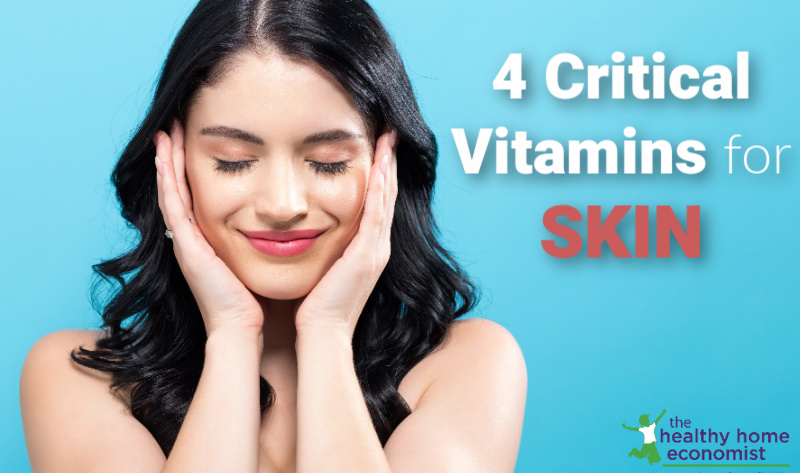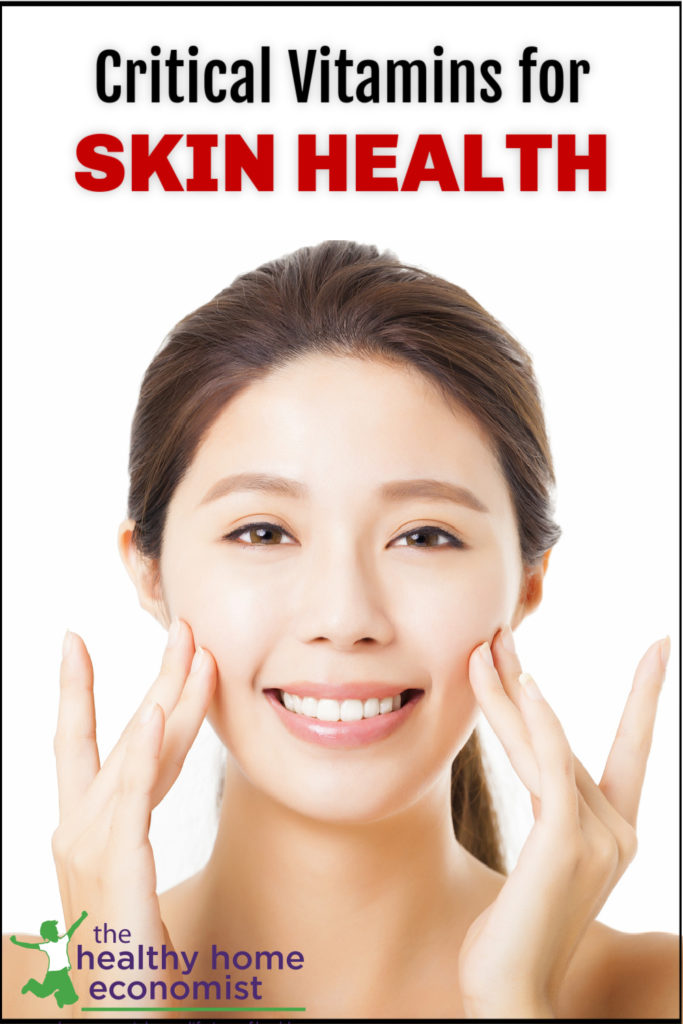Table of Contents[Hide][Show]
The four critical vitamins for optimal skin health and which food sources and supplements are best for getting natural forms into the diet.
The beauty business, a $43 billion industry, is filled with topical solutions to make skin healthier and clearer. Improvements in complexion and tone and even promises of miracle anti-aging effects lure consumers to buy, buy, BUY.
As large as the beauty industry is, however, only a very small part is focused on the very important internal factor that contributes to skin health.
As a Registered Dietician Nutritionist and Nutritional Therapist, skincare is a subject near and dear to my heart. For years I suffered from skin issues, specifically acne and red, dry, unsightly bumps on the back of my arms and upper thighs. It has taken me years to understand the cause of my skin issues, even with a healthy diet in place.
It is my most passionate subject to address and work with in regards to health. The one thing I have learned from clients with skin issues is that there is no one way to address them, yet I have always seen improvement when targeting internal health rather than the pure focus being external.
Vitamin Deficiencies of the Skin
Addressing deficiencies of particular nutrients beneficial to skin health is a great starting point, but may not be the only answer. Any internal inflammation can also affect the appearance of the skin.
This could include consuming inflammatory foods, food sensitivities, intestinal parasites, or digestive distress that can lead to leaky gut, bacterial overgrowth, malabsorption, and increased susceptibility to infections.
Dr. Georgianna Donadio, PhD, DC, MSc and founder of the National Institute of Whole Health states:
Your skin is the fingerprint of what is going on inside your body, and all skin conditions, from psoriasis to acne to aging, are the manifestations of your body’s internal needs, including its nutritional needs.
The first step to start working on improving your skin is most definitely through diet. This will begin to address the root problem, as using special creams and soaps is only treating symptoms, and even then does a minimal job at best.
Poor nutrition in many cases can be the answer for a surprising number of people. Even if it may not be the only solution one may need, it is crucial for allowing the skin to heal and reduce inflammation.
Your skin needs many nutrients: vitamins, minerals, proteins, fats, and antioxidants to keep it looking its best. Let’s take a look at four specific vitamins to make sure you are getting in your diet as they are critical to skin health.
Vitamin A
Vitamin A, also known as retinol, is frequently used in conventional skin treatments, both topically and internally, especially in regards to acne. Deficiencies of vitamin A can exacerbate skin conditions and can cause symptoms such as dry, flaky, rough, and scaly skin.
A common sign of vitamin A deficiency is keratosis pilaris, which results in red bumps on the back of the arms.
I personally had this for years, and recently have been able to successfully address it by supplementing with true vitamin A, but also by treating the deeper cause of why there was a vitamin A deficiency in the first place.
Plant vs Animal Sources
A common mistake people make when trying to get more of this nutrient into the diet is mistaking beta carotene for true Vitamin A.
The main difference is that true vitamin A is the active form that can be used immediately by the body. Beta carotene, however, must be converted by the body into the active form. The conversion of beta carotene to retinol by the digestive tract is inefficient at best. For those with gut problems, it may not occur at all.
In marketing, there is no distinction between these forms and therefore many people think they are getting vitamin A through plant foods, such as carrots, leafy greens, and sweet potatoes, when they are really only receiving carotenes.
Food Sources
True sources of vitamin A come from animal sources alone. Thus, vegans are at special risk for deficiency.
Examples include virgin cod liver oil and organ meats like grass-fed liver. Other excellent food sources include pastured cream, butter, and egg yolks.
It is also important to note that vitamin A is a fat-soluble vitamin. This means that you need to consume fat with it to absorb it or convert it from carotenes from plant sources.
It is much easier for the body to use the straight form of vitamin A. In other words, relying on needed co-factors to make the conversion from plant sources is inefficient at best.
It is these nutrient-dense sources of Vitamin A from animal foods that can really help to improve overall skin health with increased dietary intake.
Vitamin C
Vitamin C has many benefits and truly is a super nutrient. Being an antioxidant, it helps to repair damage caused by overexposure to sun or toxins, especially when consumed with vitamin E. It also helps to support collagen and overall skin tone- a natural anti-ager and rejuvenator.
You can safely take in vitamin C up to 1,000 milligrams per day, according to the American Academy of Dermatology. Just be aware that high dosages of vitamin C can cause loose bowels and even headaches, so adjust accordingly.
Beware of lab isolated Vitamin C, aka ascorbic acid, which is a synthetic form and usually GMO derived!
Food sources
Citrus, acerola cherries, camu camu berries, bell peppers, guava, leafy greens, parsley, cooked broccoli, and strawberries make excellent sources.
A quality, whole food vitamin C supplement is an excellent way to ensure you get enough.
Vitamin E
Natural vitamin E is another common nutrient and antioxidant in mainstream skin treatments.
It is helpful in reducing the appearance of wrinkles, and like whole food-based vitamin C, helps to repair damage. Like vitamin A, it is a fat-soluble vitamin, but the most abundant found in the skin itself. Be sure to eat whole food sources with healthy fats to absorb and utilize.
Food sources
Sunflower seeds, almonds, spinach, chard, prunes, tomatoes, cabbage, asparagus, avocados, and pure extra virgin olive oil are all excellent food sources. Wheat germ oil is also a good source, but consider that wheat germ is a highly processed food.
Vitamin K2
Vitamin K2 is a lesser-known vitamin in mainstream health and therefore is a common missing link in the modern diet. This amazing and underappreciated nutrient helps with calcium utilization, the key factor in maintaining both bone and cardiovascular health.
If you are wondering if the plant versus animal form of K2 is best, the linked article explains the differences in detail.
More recently, research has shown Vitamin K2’s importance in activating proteins responsible for healthy tissues, making K2 critical to prevent and reduce wrinkles.
This elusive nutrient is also synergistic for the proper absorption and metabolism of Vitamins A and D.
Vitamin A is recommended frequently by dermatologists. But, when was the last time you were told to supplement with vitamin K2 in conjunction? Food sources are best as they will have a natural synergy with vitamins A and D.
Food sources
Fermented foods like sauerkraut and non-GMO natto along with full fat pastured dairy products such as butter and cream, egg yolks, and liver are good sources. Note that conventional dairy products from grain-fed animals will NOT contain any vitamin K2 unless they are fermented. Fermentation produces the MK-7 form of K2.
Grassfed butter oil or ghee contains the MK-4 (animal) version of K2. MK-4 is more potent than MK-7, but doesn’t last as long in the body.
If you are looking for a good K2 supplement, emu oil also is a good dairy-free source of MK-4 and natto extract provides a potent form of MK-7.
Conclusion
Make sure that you take into consideration common food sensitivities, as many people may not be able to tolerate some natural sources of these skin-loving vitamins.
Always listen to your body and watch for reactions. These may be immediate or delayed by a day or more.
Exercising discretion with the sources you choose ensures that your digestion will cooperate to produce the most glowing skin imaginable!

References
(1) Nutrition and Nutritional Supplementation
(2) Nutrients for Healthy Skin. Inside and Out








Great emphasis on nourishing from within and seeing the whole picture. Thank you for the helpful breakdown!
Hello,
I am at my wits end with my Keratosis pilaris! i have been supplementing with fermented cod liver oil-butter oil but it only has slightly gotten better. What other things would you suggest i take
thank you
Great article, Carla! I like it. Very helpful information.
Thanks for sharing.
Great article, Carla! I like it. Very helpful information. Thanks for sharing.